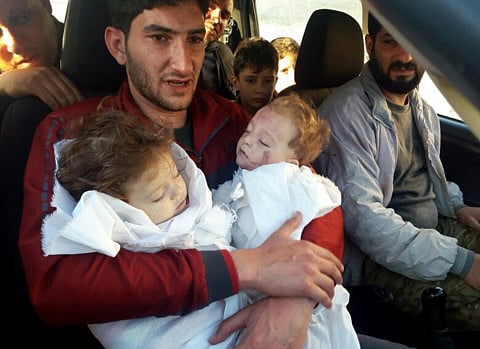Trump used Syria gas attack as a deflection
The strike would show his critics that he was not afraid to confront Russia, and would also send a severe message to North Korea and Iran

Only days after senior US officials stated that removing President Bashar Al Assad was no longer a priority and that his fate lies, in the long run, with the Syrian people, President Donald Trump ordered a missile strike against a Syrian military airbase in retaliation for a chemical attack on Khan Shaikhoun in Idlib last Wednesday which was blamed on the regime. Trump was visibly horrified by the dramatic scenes of suffocating babies and so was the rest of the world. Less than 48 hours later, the US launched 59 Tomahawks from two warships in the Eastern Mediterranean targeting Al Shayrat airbase near Homs, from where fighter jets had carried out the lethal attack.
It was a stern warning from President Trump to the Syrian regime and its allies; that the use of chemical weapons will not be tolerated. Trump had reinforced President Barack Obama’s 2013 ‘red line’. And in contrast to a hesitant former president, Trump followed his threats with action. Despite protests and condemnations by Russia, which insisted that the Damascus regime had surrendered its chemical weapons arsenal years ago, the strike was welcomed by the rest of the world. Trump had passed his first foreign policy test with flying colours. He had asserted America’s leadership after years of speculation and doubts under Obama.
Calls for the need to find out what really happened in Khan Shaikhoun and questions about the legality of the US action were brushed aside. Moscow and Tehran condemned what they described as “US aggression.” Russia warned that the strike would damage relations with the US and promised to strengthen Syria’s aerial defences. Despite the presence of Russian S-400 and S-300 anti-air missile systems in Syria, Moscow, which was informed of the attack a few hours before did nothing to stop it.
It is hard to believe that Trump’s swift reaction was triggered entirely by the horrific scenes of dying Syrian babies. Civilians, including children, have been the primary victims of the seven-year-old civil war in Syria and the regime, using crude barrel bombs and other deadly weapons, is blamed for the majority of the 400,000 deaths so far. The regime is suspected of using chemical weapons in a number of attacks since 2013.
Growing credibility problems
Trump has made it clear before that his main goals in Syria were to defeat Daesh (the self-proclaimed Islamic State of Iraq and the Levant) and to roll back Iran’s influence in that country. Until the Khan Shaikhoun attack, Trump believed Al Assad was fighting the terrorists and that he was more of an ally than a foe.
The US had little interaction with the Geneva and Astana processes and was more interested in creating a foothold in north-eastern Syria to provide military support to Syrian Kurdish fighters preparing to advance on Raqqa, the self-proclaimed capital of the Daesh caliphate.
But Trump had growing credibility problems at home. The FBI and Congress were investigating alleged ties by senior Trump campaign aides to the Russians, and looking at clues pointing to the Kremlin’s interference in the US presidential elections. His bid to repeal and replace Obamacare, as his first legislation, was derailed by lawmakers, including Republicans. His unsubstantiated claims that Obama had wiretapped his phones embroiled him in side-wars with the media and the Democratic Party. Trump badly needed a deflection and an opportunity to reset his troubled presidency. Then came the Syria incident.
It was a golden opportunity to win multiple scores on as many fronts. Trump could finally discredit Obama and prove to his constituency and to the world that he wouldn’t baulk when it came to taking decisions as commander-in-chief.
The Syria strike would show his allies as well as his foes that he means business and that his words and threats carry weight. It would show his critics that he was not afraid to confront Russia, even in its own turf. The strike would also send a severe message to North Korea and Iran.
But beyond that it would be hasty to assume that Washington is about to take on Al Assad. The strike had a limited effect on Syria’s military capabilities and the stricken base remains operational. Although the US threatened further action in the future, it is unlikely that it would risk confrontation with Russia in Syria.
The US strike may have heightened tensions between Washington and Moscow, but the two powers realise that there are many issues between them that need to be discussed. As the foreign ministers of the two countries meet in Moscow this week, the fate of the political process in Syria will certainly feature in their talks. Both would want to see the Geneva negotiations proceed to prevent future altercation in Syria. Al Assad may be swayed to take the Geneva talks more seriously. Defeating Daesh and harnessing Iran’s influence are two issues that both sides have in common.
For Trump the latest intervention was almost cost free.
The benefits were enormous. It was a deal he could not afford to miss.
Osama Al Sharif is a journalist and political commentator based in Amman.



